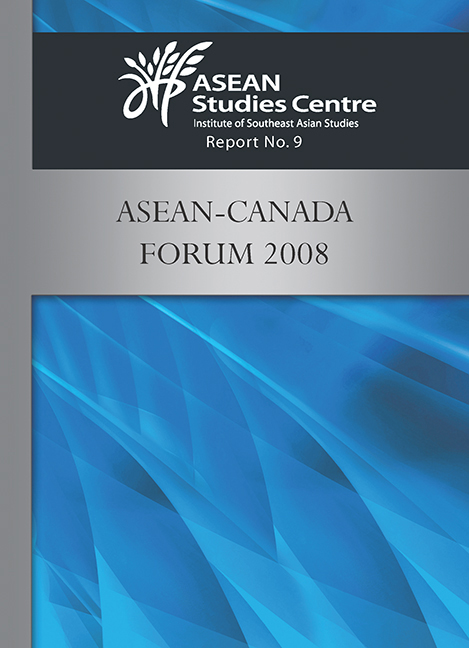Book contents
- Frontmatter
- Dedication
- Contents
- Introduction
- I Regional Economic Integration: ASEAN and Canadian Perspectives
- II Background Papers
- 1 AFTA–NAFTA: Trade and Investment Issues
- 2 Trade and Investment Issues in ASEAN Economic Integration
- 3 Institutional Development in ASEAN
- 4 Governance Issues in NAFTA
- 5 Different Approaches to Dispute Resolution under ASEAN
- 6 Dispute Resolution under NAFTA: Evolution and Stagnation
- 7 Winners and Losers in ASEAN Economic Integration: A Perspective from Vietnam
- 8 Winners and Losers in International Economic Integration: The Distributional Effects of NAFTA
- 9 Cross-border Labour Migration in ASEAN: Issues and Challenges
- 10 Labour Market Integration within NAFTA
- Annex I: Programme of the Forum
- Annex II: List of Participants
- Annex III: Rules-based Governance
5 - Different Approaches to Dispute Resolution under ASEAN
from II - Background Papers
Published online by Cambridge University Press: 21 October 2015
- Frontmatter
- Dedication
- Contents
- Introduction
- I Regional Economic Integration: ASEAN and Canadian Perspectives
- II Background Papers
- 1 AFTA–NAFTA: Trade and Investment Issues
- 2 Trade and Investment Issues in ASEAN Economic Integration
- 3 Institutional Development in ASEAN
- 4 Governance Issues in NAFTA
- 5 Different Approaches to Dispute Resolution under ASEAN
- 6 Dispute Resolution under NAFTA: Evolution and Stagnation
- 7 Winners and Losers in ASEAN Economic Integration: A Perspective from Vietnam
- 8 Winners and Losers in International Economic Integration: The Distributional Effects of NAFTA
- 9 Cross-border Labour Migration in ASEAN: Issues and Challenges
- 10 Labour Market Integration within NAFTA
- Annex I: Programme of the Forum
- Annex II: List of Participants
- Annex III: Rules-based Governance
Summary
Introduction
On 21 October 2008, Indonesia ratified the ASEAN Charter,becoming the tenth and final member of ASEAN to do so. Under Article 47 of the Charter, all members must sign and ratify it. Upon the coming into force of the Charter, a new formal legal framework comes into being for the organization. Within this framework are elements of a dispute settlement mini-charter as well. This mini-framework can be found primarily in Chapter VIII of the Charter. While some of its elements are not new, in that they reaffirm the use of existing dispute settlement mechanisms within ASEAN agreements, it does provide an “umbrella” framework that sets out general directions and principles for disputes arising out of ASEAN.
Apart from provisions in this new Charter, ASEAN's dispute settlement provisions are found in a number of sources. The major ones are the:
– Protocol on Enhanced Dispute Settlement Mechanism;
– Framework Agreement on Enhancing ASEAN Economic Cooperation;
– ASEAN Framework Agreement on Services;
– Framework Agreement on ASEAN Investment Area;
– ASEAN Agreement for the Promotion and Protection of Investments; and
– Treaty of Amity and Cooperation in Southeast Asia.
Therefore, unlike the North America Free Trade Agreement (NAFTA), whose dispute settlement provisions are primarily in a single document and apply to trade- and investment-related matters, ASEAN provisions are scattered over a number of documents, and cover both trade/investment disputes and other (for example, political, or territorial) disputes.
For the purpose of this article and in the context of this forum, focus will be placed on the dispute settlement mechanisms for economic agreement disputes.
ASEAN Legal Framework for Dispute Resolution
As has been pointed out by Singapore's Attorney-General, Professor Walter Woon, the ASEAN Charter adopts a “common sense approach” to dispute settlement.
- Type
- Chapter
- Information
- ASEAN-Canada Forum 2008 , pp. 87 - 106Publisher: ISEAS–Yusof Ishak InstitutePrint publication year: 2010



